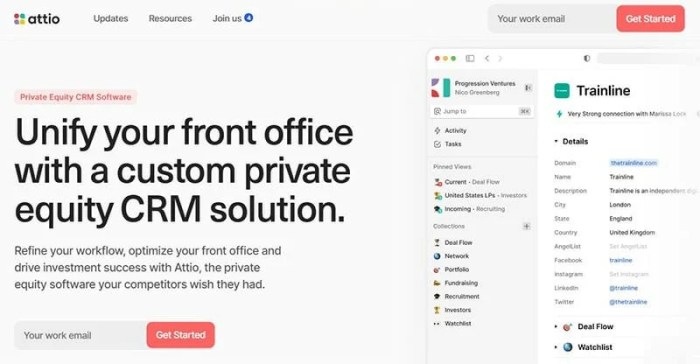Best crm software for private equity – Private equity firms require robust Customer Relationship Management (CRM) systems to effectively manage complex relationships, track deal flow, and maintain a competitive edge. Choosing the right CRM can significantly improve efficiency, streamline processes, and ultimately boost investment returns. This comprehensive guide explores the best CRM software options tailored to the unique needs of private equity firms, considering factors like deal management, portfolio company oversight, investor relations, and reporting.
Key Features to Consider in a Private Equity CRM
Selecting the ideal CRM involves carefully evaluating several key features. A one-size-fits-all approach rarely works in the sophisticated world of private equity. Here are some crucial aspects to consider:
Deal Management Capabilities
- Comprehensive Deal Tracking: The CRM should provide a centralized repository for all deal-related information, including contact details, deal stages, valuations, due diligence documents, and financial projections. Seamless integration with other financial tools is essential.
- Automated Workflows: Automating tasks like sending email reminders, updating deal stages, and generating reports frees up valuable time for deal professionals to focus on strategic initiatives.
- Collaboration Tools: Efficient internal and external communication is vital. The CRM should facilitate seamless collaboration among team members, advisors, and investors.
- Reporting and Analytics: Robust reporting capabilities are critical for monitoring deal performance, identifying trends, and making data-driven investment decisions. Customizable dashboards are a significant advantage.
Portfolio Company Management
- Performance Tracking: The CRM should allow for the monitoring of key performance indicators (KPIs) for portfolio companies, providing real-time insights into their financial health and operational efficiency.
- Communication Management: Maintaining consistent communication with portfolio company management is crucial. The CRM should facilitate regular updates, performance reviews, and strategic planning sessions.
- Document Management: Securely storing and accessing important documents, such as financial statements, board meeting minutes, and legal agreements, is essential for efficient portfolio management.
Investor Relations Management
- Investor Communication: The CRM should streamline communication with limited partners (LPs) and other investors, ensuring timely updates on portfolio performance and investment strategies.
- Reporting and Transparency: Regular and transparent reporting is crucial for maintaining strong investor relationships. The CRM should facilitate the generation of customized reports tailored to individual investor needs.
- Capital Call Management: Efficiently managing capital calls and distributions is critical. The CRM should provide tools for tracking capital commitments, distributions, and investor contributions.
Integration and Customization
- Third-Party Integrations: Seamless integration with other software used by the firm, such as financial modeling tools, email marketing platforms, and document management systems, is crucial for maximizing efficiency.
- Customizable Workflows: The CRM should be adaptable to the firm’s unique processes and workflows, allowing for customization to meet specific needs.
- Scalability: The CRM should be able to scale with the firm’s growth, accommodating increasing numbers of deals, portfolio companies, and investors.
Top CRM Software Options for Private Equity
Several CRM platforms stand out for their suitability to the private equity industry. The best choice will depend on the specific needs and size of the firm.
1. Salesforce, Best crm software for private equity
Salesforce is a leading CRM platform known for its extensive features, customization options, and robust integrations. Its scalability makes it suitable for firms of all sizes. However, its complexity can require significant training and setup costs.
2. Microsoft Dynamics 365
Microsoft Dynamics 365 offers a comprehensive suite of CRM tools, including robust deal management capabilities and strong integration with other Microsoft products. It’s a good choice for firms already invested in the Microsoft ecosystem.
3. HubSpot
HubSpot is a popular CRM known for its user-friendly interface and comprehensive marketing automation tools. While not specifically designed for private equity, its flexibility and integrations make it a viable option for smaller firms.
4. DealCloud
DealCloud is a purpose-built CRM specifically designed for private equity firms. It offers specialized features for deal management, portfolio company oversight, and investor relations. Its focus on the industry makes it a strong contender for firms seeking specialized functionality.
5. Copper
Copper is a CRM that integrates seamlessly with Google Workspace. Its user-friendly interface and ease of use make it a good option for smaller teams. While it may not have the same breadth of features as some other platforms, its simplicity can be an advantage.

Source: founderjar.com
Frequently Asked Questions (FAQ)
- Q: What is the average cost of a private equity CRM? A: The cost varies greatly depending on the platform, the number of users, and the features included. Expect to pay anywhere from a few hundred dollars per month to several thousand dollars per month for enterprise-level solutions.
- Q: How long does it take to implement a new CRM? A: Implementation time depends on the complexity of the CRM and the size of the firm. It can range from a few weeks to several months.
- Q: What are the key performance indicators (KPIs) to track in a private equity CRM? A: KPIs can include deal flow, deal closure rates, portfolio company performance (revenue, EBITDA, etc.), investor satisfaction, and capital deployment efficiency.
- Q: How can I ensure data security in my private equity CRM? A: Choose a reputable vendor with robust security measures, including data encryption, access controls, and regular security audits. Comply with relevant data privacy regulations.
- Q: What are the benefits of using a CRM for private equity? A: Benefits include improved deal flow management, enhanced portfolio company oversight, stronger investor relations, better data-driven decision-making, increased operational efficiency, and ultimately, improved investment returns.
Choosing the Right CRM for Your Firm
The best CRM for your private equity firm will depend on your specific needs, budget, and technical capabilities. Carefully consider the features discussed above and explore the options available to find the perfect fit. Consider conducting thorough demos and requesting references before making a final decision.
References
While specific product pages are dynamic and URLs can change, searching for the following terms on Google or your preferred search engine will provide up-to-date information and comparisons:
- Salesforce Private Equity Solutions
- Microsoft Dynamics 365 for Private Equity
- HubSpot for Private Equity
- DealCloud Reviews
- Copper CRM Integrations
Call to Action: Best Crm Software For Private Equity
Ready to streamline your private equity operations and unlock greater efficiency? Contact us today for a consultation to discuss your specific needs and explore the best CRM solution for your firm.
Frequently Asked Questions
What are the key features to look for in a private equity CRM?
Deal tracking, investor relationship management (IRM), portfolio management, reporting and analytics, document management, and seamless integration with other financial software.
How much does private equity CRM software typically cost?
Pricing varies significantly depending on the features, number of users, and vendor. Expect a range from several hundred to thousands of dollars per month.
Can a CRM system help with compliance in private equity?

Source: contentmavericks.com
Yes, some CRMs offer features that assist with regulatory compliance by providing audit trails and secure data storage, although this is not a universal feature.
What are some examples of popular private equity CRM software?
Several vendors offer solutions, but specific recommendations depend on individual needs. Researching various options is crucial before making a decision.
